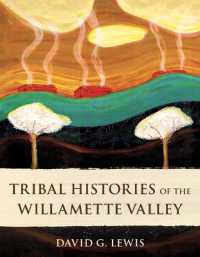- ホーム
- > 洋書
- > 英文書
- > Biography / Autobiography
Full Description
For the first time in English, a key work of critical geography
Originally published in 1978 in Portuguese, For a New Geography is a milestone in the history of critical geography, and it marked the emergence of its author, Milton Santos (1926-2001), as a major interpreter of geographical thought, a prominent Afro-Brazilian public intellectual, and one of the foremost global theorists of space.
Published in the midst of a crisis in geographical thought, For a New Geography functioned as a bridge between geography's past and its future. In advancing his vision of a geography of action and liberation, Santos begins by turning to the roots of modern geography and its colonial legacies. Moving from a critique of the shortcomings of geography from the field's foundations as a modern science to the outline of a new field of critical geography, he sets forth both an ontology of space and a methodology for geography. In so doing, he introduces novel theoretical categories to the analysis of space. It is, in short, both a critique of the Northern, Anglo-centric discipline from within and a systematic critique of its flaws and assumptions from outside.
Critical geography has developed in the past four decades into a heterogenous and creative field of enquiry. Though accruing a set of theoretical touchstones in the process, it has become detached from a longer and broader history of geographical thought. For a New Geography reconciles these divergent histories. Arriving in English at a time of renewed interest in alternative geographical traditions and the history of radical geography, it takes its place in the canonical works of critical geography.
Contents
Contents
Translator's Introduction: The Newness of Geography
Archie Davies
Introduction: From a Critique of Geography to a Critical Geography
Part I. The Critique of Geography
1. The Founders: Scientific Pretensions
2. Philosophical Inheritance
3. Postwar Renovation: "A New Geography"
4. Quantitative Geography
5. Models and Systems: The Ecosystems
6. The Geography of Perception and Behavior
7. The Triumph of Formalism and Ideology
8. The Balance of the Crisis: Geography, Widow of Space
Part II. Geography, Society, Space
9. A New Interdisciplinarity
10. An Attempt to Define Space
11. Space: Reflection of Society or Social Fact?
12. Space: A Factor?
13. Space as Social Order
Part III. For a Critical Geography
14. In Search of a Paradigm
15. Total Space in Our Time
16. State and Space: The Nation-State as a Geographical Unit of Study
17. The Ideas of Totality and Social Formation and the Renovation of Geography
18. The Idea of Time in Geographical Studies
Conclusion: Geography and the Future of Man
Acknowledgments
Notes
Bibliography
Index








